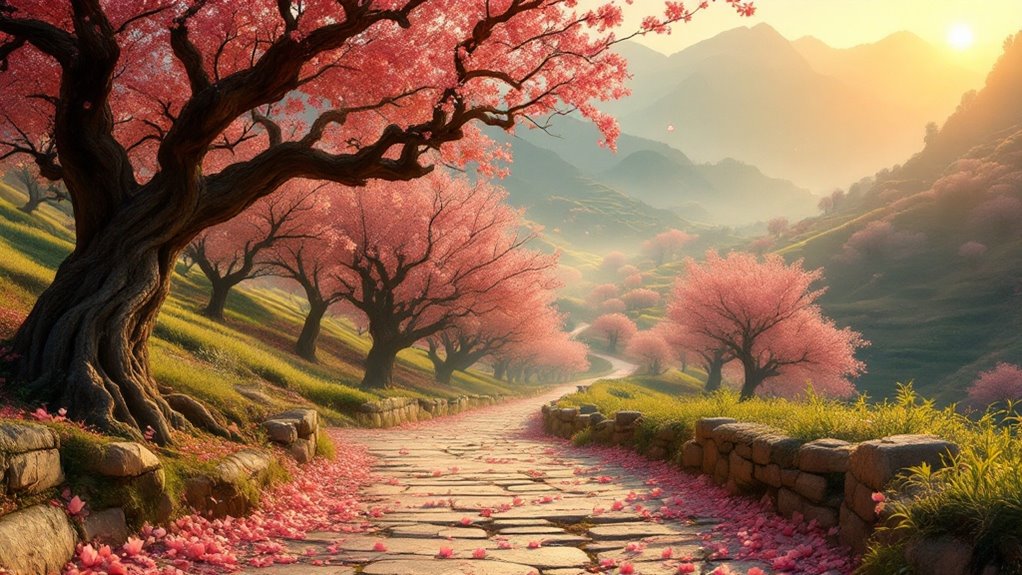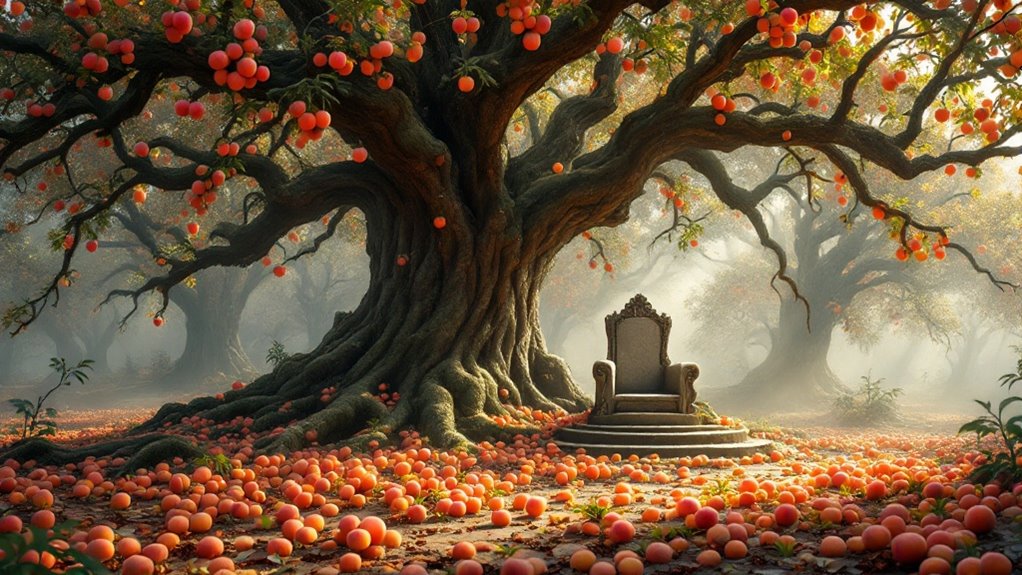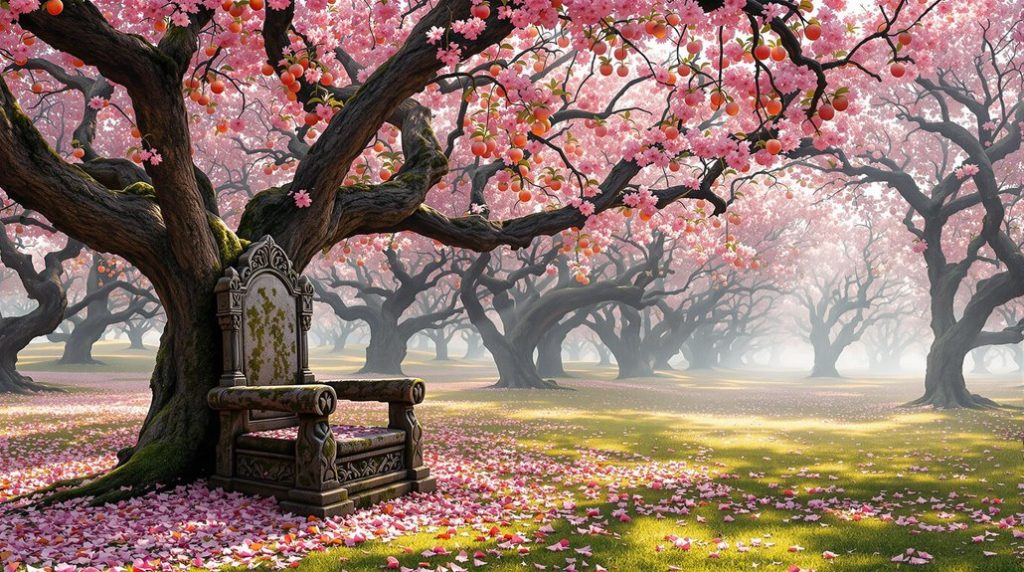When I consider how the biblical Tree of Life parallels the Queen Mother's celestial peach orchard, I'm struck by humanity's persistent quest to overcome mortality through sacred fruits.
I've found that the Chinese myth of Xi Wangmu's divine peaches offers more than just another tale of forbidden consumption – it reveals archetypal patterns of transcendence that emerge across cultures. While Eden's fruit brought death through knowledge, these mythical peaches granted immortality through divine grace, suggesting a fascinating Eastern interpretation of humanity's relationship with the eternal.
There's much more to unpack in how this garden mirrors our universal yearning for immortality.
Ancient Origins of Sacred Peaches
The alluring, shimmering peaches found in the celestial orchard of the Queen Mother of the West reveal the intriguing intersection of divinity and mysticism in ancient Chinese culture. These extraordinary fruits were no ordinary peaches, but were carefully cultivated to serve as the key to immortality. According to legend, the Queen Mother would bestow these sacred peaches upon gods and hand-picked mortals during mystical, grandiose feasts.
The Classic of Mountains and Seas, a foundational text of Chinese mythology, illuminates the profound symbolic weight that peaches carried in cosmic lore surrounding spiritual protection. Beyond being mere symbols, these fruits were believed to be actual portals to an eternal existence. The Eight Immortals themselves sought these divine fruits in numerous tales. When one delves into China's rich mythological history, the presence of peaches is ubiquitous – from the ceremonial use of peachwood combs to banish sinister spirits to the hanging of peach branches over doorways as a safeguard against malevolent forces. The peach has been a powerful talisman permeating every facet of Chinese spirituality, profoundly exemplifying the innate human yearning for immortality embodied within this archetypal fruit.
Peach Varieties and Their Powers
The ancient peach groves of Chinese mythology reveal three distinct varieties of immortality-granting fruits, each marked by their own cosmic flowering cycles and supernatural powers. The first variety, which blooms every 3,000 years, bestows the foundational gifts of longevity and heightened wisdom. However, it's the second type that really captures my interest. Emerging every 6,000 years, this peach grants the extraordinary power of flight alongside eternal youth. The third variety represents the ultimate transcendence – blooming every 9,000 years, with its distinctive purple streaks, it aligns your existence with the eternal rhythms of heaven and earth themselves. These aren't mere fruits; they're keys to liberation from mortal constraints, each offering a unique pathway to break free from earthly limitations. Like all peach trees, these mystical varieties required 700 chilling hours during winter months for proper bud development.
The Queen Mother's Divine Garden

The heart of the Queen Mother's estate beats with spirituality in her wondrous gardens, where I've unearthed a captivating blend of classical wisdom and Islamic mysticism. At Walmer Castle, I've witnessed how the reflective pools mirror heaven's divine symmetry, while sculptural cardoons and agapanthus reach skyward like ancient temple pillars. The garden's elegant arched pavilion creates a transcendent focal point beside the serene rectangular pool.
Let me share a secret with you: these aren't merely gardens – they're spiritual blueprints. The Castle of Mey's transformation from wilderness to walled sanctuary parallels humanity's journey from chaos to order. In the Queen Mother's gardens, I've found recurring archetypal patterns: the sacred square of Islamic paradise gardens, the circular cycles of seasonal renewal, and the eternal dance of light and shadow beneath the Paul's Scarlet Hawthorn trees.
Theft Stories and Immortal Consequences
Stealing divine fruit carries profound archetypal weight across world mythologies, with no better example than Sun Wukong's theft of the Queen Mother's immortal peaches. These fruits weren't ordinary – they ripened over millennia and granted longevity equal to Heaven and Earth itself. The punishment fits the cosmic crime: 800 blows on the left, 3,000 on the right, reflecting the sacred intervals of the peaches' ripening cycles.
This resonates with early American apple-stealing, which wasn't even considered a real crime. Yet the Oak Park peach thief case shows how deeply we still connect to this archetype. Whether it's immortal peaches or backyard fruits, the violation of taking what's not ours strikes a chord across time and culture.
Eternal Fruits Through The Ages

Humanity has long been fascinated by mythological fruits that promise eternal life. These legendary fruits have captivated our imaginations since our earliest stories emerged. Tracing these immortal fruits across various cultures reveals striking archetypal patterns – from the Queen Mother's divine peaches in Chinese lore to Norse mythology's golden apples of Asgard.
What's truly fascinating is that these eternal fruits share common symbolic threads:
- They're guarded by supernatural beings or divine gardeners
- They're exclusively reserved for gods or chosen mortals
- They represent both wisdom and physical immortality
It's intriguing to see how humanity's obsession with preserving fruit parallels these mythological quests. From ancient honey preservation to sugar-based techniques, we've long sought to capture fruit's ephemeral nature. It's as if we're still chasing those mythical orchards, trying to grasp eternity through preservation.
Our pursuit of eternal youth and immortality is reflected in the way we endeavor to halt the decay of fruit. The parallels are undeniable; we've been chasing these metaphorical fruits for centuries through both mythology and preservation techniques.
Frequently Asked Questions
Can Mortals Visit the Queen Mother's Peach Orchard Today?
Can Mortals Visit the Queen Mother's Peach Orchard Today?
The Queen Mother's Peach Orchard is a purely mythological place in Chinese lore. So no, as a mortal, you won't be able to visit it today as it doesn't actually exist in our real world.
The story goes that the Queen Mother of the West would invite the gods to a peach banquet in her orchard, which was located on a mountain. Thisfruit was said to grant immortality to those who ate it. But unfortunately, this enchanting orchard is something you'd only read about in classic Chinese tales and not a real place you could travel to.
What Happens if Someone Eats Only Half of an Immortality Peach?
So what's the deal with someone only eating half of an immortality peach? The ancient Chinese myths don't really spell it out. But based on the usual patterns, I'd say you probably need to consume the whole thing to get the full transformative effect and reach godly status. Just my two cents though.
Do the Peaches Taste Different From Regular Earthly Peaches?
Like honey from heaven, I can tell you these divine peaches surpass regular ones with an otherworldly sweetness. They explode with juicy, nectar-like flavors that dance on your tongue and awaken your spirit's deepest longings.
Can Immortality Be Reversed After Eating the Sacred Peaches?
I find no mythological references suggesting immortality can be reversed once someone has consumed the sacred peaches. Transformative spiritual experiences like this tend to be permanent and one-way.
How Many Immortal Beings Were Created Through the Queen Mother's Peaches?
Ever wonder how many immortals got eternal life from eating the Queen Mother's magical peaches? While ancient texts don't give an exact number, I found records of notable immortals like the Monkey King Sun Wukong and Dongfang Suo who achieved immortality after tasting the legendary fruit.


